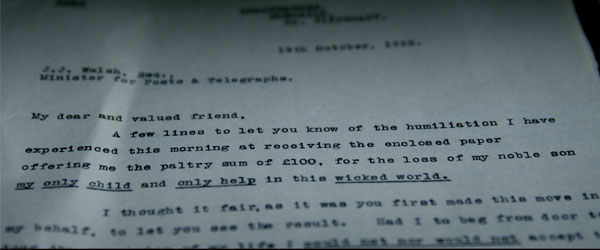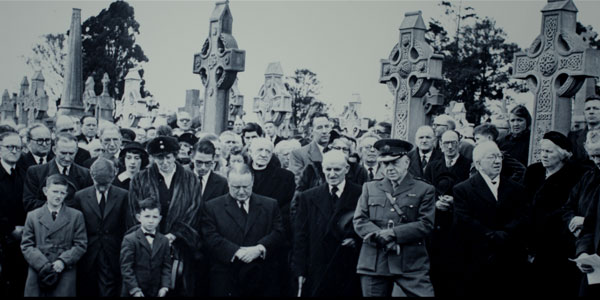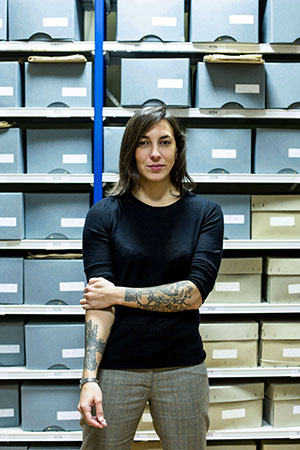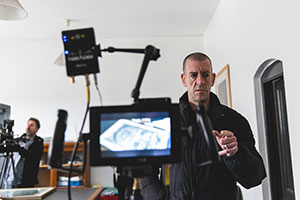Keepers of the flame
Published in Issue 5 (September/October 2018), Reviews, Volume 26A South Wind Blows production, directed by Nuala O’Connor
(in selected Irish cinemas from November 2018)
By Conor McNamara
An unprecedented popular interest in the history of the Irish Revolution has generated a plethora of documentaries and television series in recent years, kicked off by the uniquely emotive centenary of the 1916 Rising. Keepers of the flame explores the legacy of the Irish Revolution and, in particular, the archives of the Military Service Pension Board generated by the Irish Free State for the purpose of administering military pensions for those who participated in the independence struggle. More acutely, however, this documentary explores the problematic nature of memory and remembrance, and the silences and indignities that characterised the afterlives of many veterans of the independence struggle.
Running for almost one and a half hours, the film opens with Diarmaid Ferriter posing the fundamental question, ‘What is the truth? … is there a danger that memory will play tricks? It makes you think about the difference between history and memory, the idea that time has deformed certain memories into certainties and that’s a universal process and a universal theme.’
The film’s narrative focus on unsuccessful claims—those not fortunate enough to receive pensions from the state for military service—as much as the applications of successful claimaints goes to the heart of post-revolutionary disillusionment in Ireland: 85,000 people applied for financial compensation for military service during the independence struggle, but just 18,000 applications were successful. It is in the resentment and disillusionment generated by rejected claims that much of the fundamental truth of revolution and its aftermath is revealed. The painful gap between the revolutionaries’ belief in the significance of their own contribution and the sober assessment of their military credentials by the pension board brutally strips away the romantic residue of revolution.
What is unique about the archives of the Military Service Pension Board is that its manuscripts straddle the later lives of the revolutionaries—the romantic as well as the seemingly mundane, the heroic and the frequently banal, and, ultimately, the myth and the reality. It is due to these manuscripts that we have intimate insights into very private wars, as the vulnerabilities of fighters are laid bare in a manner that is frequently awkward and occasionally brutal.
Cécile Gordon, project manager at the Military Archives, contributes effectively throughout the documentary, and her opening remarks remind us that the archives represent ‘a tiny, tiny sliver of truth, a reflection of reality, but it isn’t the reality, it’s a thin part of someone’s life, in a certain context, at a particular time’. Gordon’s acknowledgement that ‘archives provoke emotional responses and they are able to challenge big narratives like national narratives that have been transformed or politicised’ reminds us that the revolution constituted just a few short years for most combatants, and it is in the familial experience of the upheaval that we find the most authentic narrative of sacrifice and loss.

Above: ‘Humiliation’—the response of Bridget Treacy on being offered £100 compensation for the death of her son, Seán.
Readings from the manuscripts are performed with sensitivity and genuine investment. Aidan Gillen, Mary Black, Iarla Ó Lionáird and Olivia O’Leary, among others, enhance the production with nuanced readings from archival documents. The real stars, however, are the ordinary descendants of the claimants, who discuss their ancestors’ claims with revealing honesty.
Historian Diarmaid Ferriter has helped provide a compelling script that focuses on the profound sense of loss felt by many fighters in the aftermath of the revolution, and he argues that a ‘hierarchy of benefit’ operated, with a bias towards those who fought in the 1916 Rising. In this respect, the indignity heaped upon Bridget Treacy, the mother of slain republican leader Seán Treacy, highlights the frequently callous nature of the military pension process. On receiving an initial offer of compensation of £100 for the loss of her son, Mrs Treacy replied that the figure represented ‘an insult and a desecration of the memory of my noble son’. The civil servant tasked with investigating her claim noted that Mrs Treacy was ‘living in very bad circumstances’ but ‘the woman has a certain amount of pride’ (Claim 1D458).

Above: At the graveside in Glasnevin during Ernie O’Malley’s state funeral in 1957. In the documentary his son Cormac admits that he had no knowledge of his father’s military activities until then.

Above: Cécile Gordon, project manager at the Military Archives, contributes effectively throughout the documentary
Placing the authentic voice of the rebel at the centre of the narrative reveals the difficulties experienced by many republican fighters in stark terms that are often heart-rending. Throughout the interviews with family members, silence and the tragedy of the Civil War loom large. In a recurring theme, family members recount the unwillingness of their parents and grandparents to discuss the realities of war. Cormac O’Malley concludes that ‘parents protected their children from their heritage’ when admitting that he had no knowledge of his father Ernie’s military activities until his state funeral in 1957. In terms of the emotional cost that afflicted the lives of many veterans, O’Malley notes that ‘they came out without having what would be called a normal youth’. In this sense, the archives, as Ferriter points out, represent a ‘corrective to silence’.
Keepers of the flame is a fine example of writers trusting their audience to be sufficiently nuanced to mediate the most divisive aspects of our modern history, avoiding the pervasive trend of presenting historical research on television as revelatory pronouncements dropped from on high on an assumedly partisan audience. Rather than telling viewers what it is assumed they don’t know, this fine piece of documentary film-making explores the universal themes of memory and loss, the functionality of history and the compulsion towards the construction of heroic narratives, without resorting to patronising the viewer.

Above: Diarmaid Ferriter—opens the film by posing the fundamental question, ‘What is the truth?’
This film is a fitting tribute to the labours of the Military Archives and to those veterans of the conflict who struggled to maintain themselves and their families long after the battle had been fought and the glow of comradeship had become a distant memory. This was a war of the young and, as President Higgins aptly remarks about his own family, ‘that was the time of the highest energies of their lives and they spent it like this, and then people move on and people age …’.
Conor McNamara teaches at the University of Minnesota Dublin Program.
















